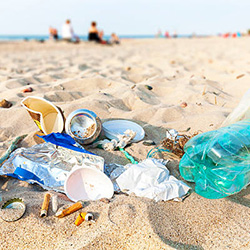| Dolphin |
🐬 How Pollution Affects Dolphins 🌍
Dolphins are intelligent and social marine mammals, but pollution is putting their survival at risk. From plastic waste to toxic chemicals, these incredible creatures are struggling to thrive in their own habitat. Let’s explore how pollution is affecting dolphins and why we must take action.
🛍️ Plastic Pollution
Dolphins often mistake plastic waste for food, leading to severe health issues. Ingesting plastic can block their digestive system, causing malnutrition and internal injuries. Additionally, discarded fishing nets and plastic debris can entangle dolphins, restricting their movement and making it harder for them to surface for air.
☠️ Chemical Pollution
Industrial chemicals, pesticides, and heavy metals like mercury contaminate the water, exposing dolphins to serious health risks. These toxins weaken their immune systems, increase the risk of disease, and cause reproductive issues. Chemical buildup in their bodies can even lead to birth defects and neurological damage.
🛢️ Oil Spills
Oil spills create devastating consequences for dolphins. The toxic substances in oil can damage their skin, affect their ability to regulate body temperature, and poison them when ingested. Exposure to oil also disrupts their respiratory system, leading to lung damage and, in many cases, death.
💡 Light Pollution
Artificial lighting along coastlines can confuse and disorient dolphins, especially in shallow waters where they come to feed or breed. This disruption can drive them away from important habitats and interfere with their natural behaviors, including hunting and socializing.
🔊 Noise Pollution
Dolphins rely on echolocation to navigate, hunt, and communicate. However, constant noise from ships, sonar, and underwater construction interferes with their ability to send and receive sound signals. This can lead to difficulty finding food, increased stress, and even fatal strandings.
🌡️ Climate Change & Ocean Pollution
Rising ocean temperatures and pollution threaten dolphins' survival. Changes in water temperature affect the availability of fish, forcing dolphins to travel farther for food. Additionally, coral reef destruction and habitat loss make it harder for them to find shelter and safe breeding areas.
